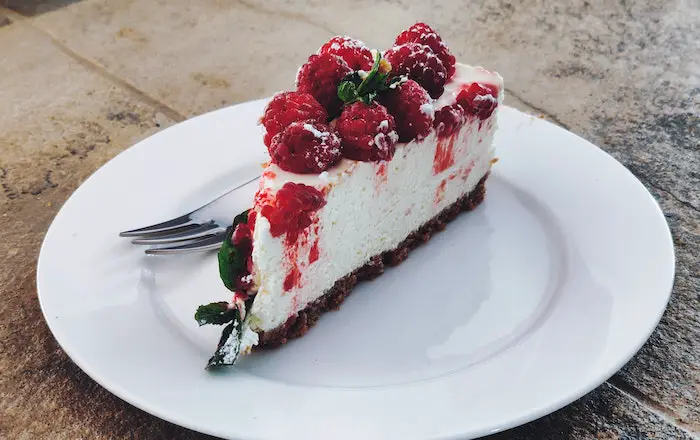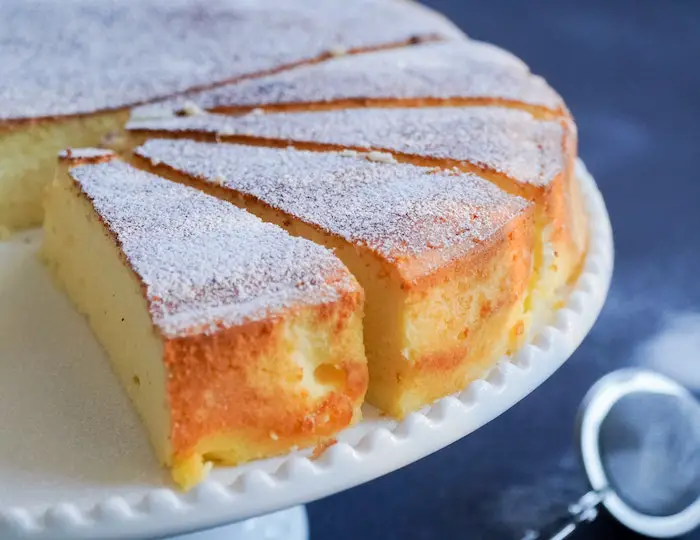Nominated-Day or Next-Day
Nominated-Day or Next-Day

Cheesecake is called "cheesecake" because does not typically contain yeast, and has a crust. Whether it’s baked or not, cheesecake is really a form of pie with a crust on the bottom.
Most baked cheesecakes use custard as the filling made up of eggs, milk, sugar, salt, vanilla or other flavors.
The classic cheesecake recipe includes cream cheese. It allows for different variations in the kind of crust, and flavors, like chocolate, and a variety of toppings ranging from nuts and fruit to sweets.
Another common misconception about cheesecakes is that they are supposed to be a sweet dessert. The famous French quiche is actually a savory cheesecake.
According to anthropologists who discovered cheese molds dating from the same time period, the art of cheesecakes can be traced back to as early as 2200 B.C. However, cheesecake is determined to have been invented in the early days of Greece.
A cheesecake is thought to have been served to athletes at the first Olympic Games held in 776 B.C. to fuel them with energy. Greek brides in the past also prepared and served cheesecakes to guests at their weddings.
In the book “The Oxford Companion to Food,” editor Alan Davidson states that cheesecake was mentioned in Marcus Porcius’ “Cato’s De re Rustica” about 200 BCE. He also notes that Cato explained how he made his cheese libum (cake) with very similar results to the modern cheesecake we recognize and love today. The Romans made cheesecake popular in Greece and right across Europe.
A few centuries later, the cheesecake was introduced to America by immigrants who introduced a range of regional recipes. When Americans think of cheesecake today it is usually associated with a dessert made from cream cheese.
Cream cheese was created back in 1872. An American dairyman called William Lawrence accidentally came across a method of creating cream cheese while trying to replicate the taste of a French cheese known as Neufchatel.
In 1880, Lawrence started distributing the cream cheese wrapped in foil under the supervision of the Empire Cheese Company of South Edmeston, New York. He came up with the first Philadelphia Brand Cream Cheese.
In 1903, the Phoenix Cheese Company bought Lawrence’s business and his Philadelphia trademark. After 1928, the Philadelphia brand was acquired by Kraft Cheese Company. James L. Kraft invented pasteurized cheese in 1912, which led to the creation of the pasteurized Philadelphia Brand cream cheese, today the most well-known and arguably the best cheese used in cheesecake.
Kraft Foods manages and produces Philadelphia Cream Cheese today.
Most traditional and authentic Greek cheesecakes are made today with ricotta cheese. The best and most authentic Greek cheesecake is unsalted Anthotyros and myzirtha cheeses made with sheep’s or goat’s milk. Greek cheesecakes taste unique and are generally sweetened with honey.
Specific recipes include flour straight into the honey/cheese mix before baking, whereas others use the crust.

The cheesecake base is typically a crust made from crushed Graham crackers, or other types of cookies. Oreos are one of my favorites for chocolate cheesecakes.
Since there are two different types of cream cheese cheesecakes, it can be confusing whether cheesecake contains eggs or why sometimes a cheesecake can become undercooked. Here is a quick and easy way to find out the difference between a baked cheesecake and a no-bake cheesecake:

There are plenty of recipes that include custard bases or have eggs included, and they both require the cake to be baked. The traditional New York Cheesecake, originating from the restaurant Junior’s located in Brooklyn, is cooked or baked cheesecake.
The no-bake cheesecake is a faster and easier way to make it consisting of cream or sour cream, Greek yogurt, lemon juice, and put in the refrigerator to chill and set – hence the name ‘no-bake cheesecake.’
The name “cheesecake” is believed to have originated because the dessert is made primarily with either cream cheese or ricotta.
Cream cheese is the main ingredient in traditional cheesecake recipes.
Cheesecake dates back to ancient Greece.
Cheesecake has evolved over time to include different types of cheese, crusts, and toppings. Today, there are a wide variety of cheesecake flavors and styles available, including traditional, fruit-topped, and chocolate-covered varieties.
Leave a comment